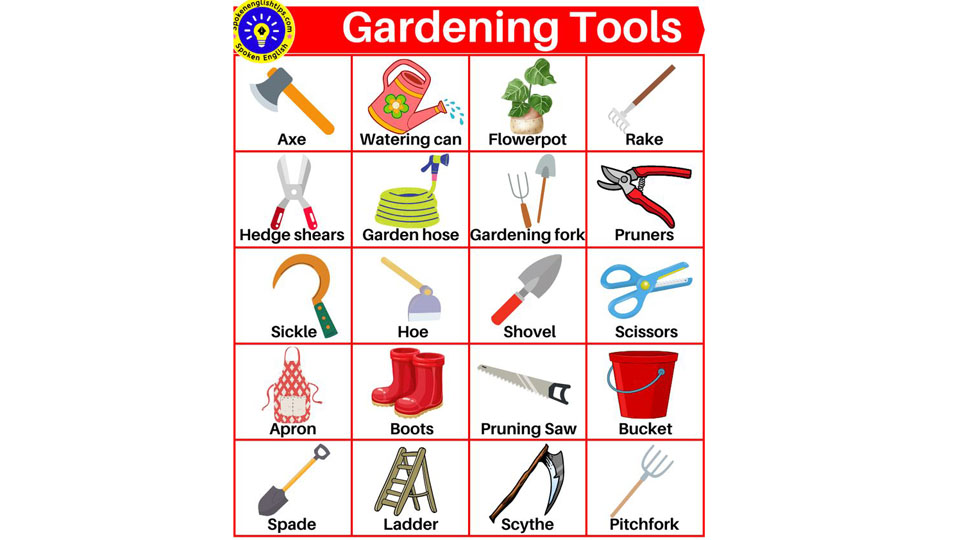Gardening has always been my little escape from the hustle and bustle of everyday life. There’s something magical about digging your hands into the soil and nurturing plants to grow. But let me tell you this – having the right tools makes all the difference. I’ve been gardening for years, and every successful gardening session starts with the right equipment.

Image by wudfdeal.store
If you’re new to gardening or just curious about the essential tools, you’re in the right place. In this guide, I’ll walk you through the 20 most common gardening tools that every gardener should have. If you’re maintaining a small backyard garden or creating an elaborate flower bed, these tools will help you tackle every task with ease.
Why Having the Right Gardening Tools Matters
Before we dive into the list, let me share why these tools are important. Gardening can be physically demanding, and without the proper equipment, tasks like digging, pruning, or weeding can become tedious and ineffective. The right tools:
- Make gardening easier and more enjoyable.
- Help prevent injuries caused by improper equipment.
- Ensure better care and maintenance of your plants.
Having the basics on hand can also save you time and frustration.
The 20 Most Common Gardening Tools
1. Garden Trowel
A garden trowel is a must-have for any gardener. It’s a small hand tool that’s perfect for digging holes, planting seeds, and transplanting small plants. Look for one with a sturdy handle and a durable blade that won’t bend.
2. Pruning Shears (Hand Pruners)
Pruning shears are essential for trimming branches, cutting flowers, and shaping shrubs. A sharp pair will give you clean cuts, which is healthier for your plants. Trust me, trying to cut branches with dull pruners is a nightmare!
3. Garden Gloves
Gardening without gloves can lead to scratches, blisters, and dirty nails. A good pair of gloves will protect your hands while providing enough flexibility to handle delicate tasks.
4. Rake
A rake is indispensable for cleaning up leaves, leveling soil, and spreading mulch. There are different types, but a standard leaf rake or a garden rake with metal tines works for most tasks.
5. Hoe
A garden hoe is perfect for breaking up soil, removing weeds, and cultivating your garden beds. Depending on your needs, you can choose a draw hoe or a scuffle hoe.
6. Spade
A spade has a flat, rectangular blade and is used for digging, edging, and cutting through roots. It’s one of those tools that you’ll find yourself reaching for time and time again.
7. Garden Fork
If you’re working with compacted soil or compost, a garden fork is invaluable. It’s great for loosening soil, turning compost, and aerating the ground.
8. Wheelbarrow
Whether you’re moving soil, mulch, or heavy pots, a wheelbarrow saves your back and makes transportation a breeze. Opt for one with a sturdy frame and pneumatic tires for smoother handling.
9. Garden Knife
A garden knife, like the Hori Hori knife, is incredibly versatile. You can use it for digging, cutting, weeding, and even dividing plants. It’s one of those tools you don’t realize you need until you have it.
10. Watering Can
For precise watering, especially in container gardens or delicate seedlings, a watering can with a spout is ideal. Look for one that’s lightweight and easy to pour.
Larger Tools for Heavy-Duty Gardening
11. Shovel
A shovel is essential for digging large holes, moving soil, or mixing compost. Unlike a spade, it has a curved blade, making it better for scooping.
12. Garden Hose
If you have a larger garden, a garden hose is a must for watering plants efficiently. Choose one with a spray nozzle to adjust the water pressure based on your needs.
13. Lawn Mower
For those with a lawn, a mower keeps the grass neat and healthy. There are push mowers, electric mowers, and gas-powered ones, depending on your yard size.
14. Edger
To give your lawn that crisp, professional look, an edger is a handy tool. It helps define the boundaries between grass and flower beds.
15. Garden Sprayer
A garden sprayer is useful for applying pesticides, fertilizers, or even just water. It’s particularly helpful for reaching areas that are hard to access.
Specialized Tools for Detail Work
16. Hand Weeder
Weeds can be a gardener’s biggest enemy. A hand weeder allows you to target and remove weeds without disturbing the surrounding plants.
17. Soil Tester
Healthy soil is the foundation of a thriving garden. A soil tester helps you measure pH levels and nutrient content, ensuring your plants get what they need.
18. Garden Scissors
Garden scissors are perfect for snipping herbs, cutting twine, or trimming smaller plants. They’re a lightweight and versatile tool to keep on hand.
19. Garden Dibber
A dibber is used to make holes for planting seeds or bulbs. It’s a simple tool, but it can save you a lot of time and effort.
20. Garden Kneeler or Cushion
Gardening often involves spending time on your knees, which can get uncomfortable. A garden kneeler or cushion protects your joints and makes the experience more enjoyable.
Tips for Choosing the Right Gardening Tools
Over the years, I’ve learned a few things about picking the best tools:
- Invest in Quality: Cheap tools may save you money upfront, but they often break or wear out quickly.
- Choose Ergonomic Designs: Look for tools with comfortable handles and lightweight designs to reduce strain.
- Consider Your Garden’s Needs: The tools you need will depend on the size and type of garden you have.
- Maintain Your Tools: Clean and store your tools properly to extend their lifespan.
How to Organize and Store Your Gardening Tools
Keeping your tools organized not only saves time but also ensures they last longer. Here are some tips:
- Use a tool rack or pegboard to hang larger tools.
- Store smaller tools in a toolbox or caddy.
- Clean tools after each use to prevent rust.
- Sharpen blades regularly to keep them efficient.
Conclusion
Gardening is such a fulfilling activity, but it’s so much easier when you have the right tools at your side. From basic essentials like a trowel and gloves to more specialized tools like a soil tester and garden knife, each item plays an important role in making your garden flourish.
I hope this guide helps you build your collection of gardening tools, If you’re just starting or looking to upgrade. Remember, gardening is about enjoying the process as much as the results. With the right tools and a little patience, you’ll create a beautiful and thriving garden in no time.
FAQs
What is the most important gardening tool for beginners?
A garden trowel is probably the most versatile and essential tool for beginners.
How do I keep my gardening tools in good condition?
Clean them after each use, store them in a dry place, and sharpen blades regularly.
Do I need a wheelbarrow for a small garden?
If you’re working with minimal soil or mulch, a wheelbarrow may not be necessary, but it’s always helpful.
Can I use kitchen scissors for gardening?
While kitchen scissors can work in a pinch, garden scissors are designed for outdoor tasks and will perform better.
What should I look for in a good pair of gardening gloves?
Look for gloves that are durable, water-resistant, and flexible enough for detailed tasks.
Are expensive gardening tools worth it?
Yes, investing in quality tools can save you money in the long run since they last longer and perform better.
Do I need all 20 tools to start gardening?
Not at all! Start with the basics like a trowel, gloves, and pruners, and build your collection as needed.

I’m Marissa Lynn, the proud author behind GardeningProperty.com! With a deep-rooted passion for all things green and growing, I’ve dedicated years to mastering the art and science of gardening.
From nurturing vibrant flowerbeds to cultivating thriving vegetable gardens, I love sharing practical tips, creative ideas, and proven techniques to help others create their dream outdoor spaces.